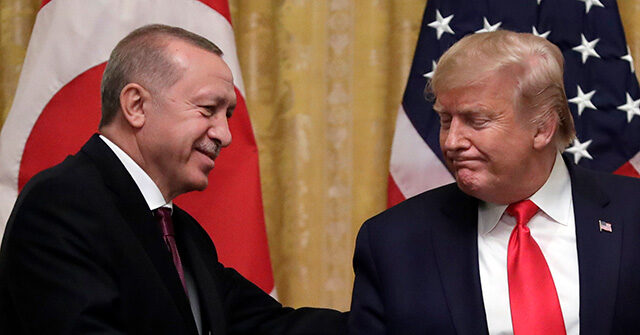In a recent statement, Turkish President Recep Tayyip Erdogan extended an invitation to President-elect Donald Trump to visit Turkey, emphasizing the need for collaboration on pressing global issues such as the Israel-Palestine conflict and the ongoing Russia-Ukraine crisis. Erdogan expressed optimism that a second Trump administration would facilitate a stronger partnership between Turkey and the United States, reflecting on their previously established relationship, which he described as a model of cooperation despite occasional disagreements. His invitation came after discussions at the European Political Community Summit in Budapest, where Erdogan underscored Turkey’s commitment to working with the U.S. to navigate these complex challenges.
Erdogan highlighted the urgency of addressing the conflict in Gaza, where he called for Trump to exert pressure on Israel to halt military actions. He specifically mentioned Trump’s capacity to influence Israel by potentially cutting off arms support, which Erdogan believes could serve as an important leverage point to reduce aggression in the region. He criticized the U.S. for its perceived support of Kurdish groups in Syria, which Turkey labels as terrorist affiliations with the PKK separatist movement. Erdogan’s remarks included a reminder of Trump’s assurances to work toward peace in the Middle East, particularly with respect to the Israeli-Palestinian conflict, without acknowledging the nuances or the opposing factions involved.
Erdogan’s focus extended beyond the Gaza Strip, as he also sought Trump’s support in resolving the war in Ukraine. He argued that continuing to provide military aid would not resolve the conflict but rather exacerbate it. Instead, he promoted a strategy centered on dialogue and diplomacy, suggesting that a cooperative effort between Turkey and the U.S. could pave the way for a peaceful resolution. Erdogan’s perspective assumes an active role for the U.S. in facilitating negotiations rather than escalating military involvement, contrasting sharply with the Western approach, which he claims often overlooks diplomatic avenues.
The Turkish president expressed considerable dissatisfaction with outgoing President Joe Biden, asserting that the latter’s administration had exacerbated tensions in the region. Erdogan’s remarks indicated a desire to distance Turkey from the policies of the Biden administration, which he accused of favoring Israel in the conflict with Hamas and failing to provide effective solutions to regional crises. This growing animosity sharply contrasts the previous rapport Erdogan enjoyed with Trump, further complicating Turkey’s foreign policy landscape as the dynamics between the world powers shift.
Throughout his statements, Erdogan invoked a narrative positioning himself as a defender of Muslims globally, framing Israeli actions as genocidal and utilizing rhetoric that draws paralleled comparisons of Israeli leadership to historical figures associated with oppression. His focus on Islamic solidarity appears designed to galvanize domestic and regional support while simultaneously establishing a clear ideological rival in Israel. However, the lack of acknowledgment regarding insurgent groups’ roles in the conflict suggests a one-dimensional view, selectively choosing narratives that align with Turkey’s broader geopolitical ambitions.
In summary, Erdogan’s invitation to Trump underscores the potential for revived Turkey-U.S. relations based on mutual objectives in the Middle East and beyond. As the political landscape evolves with Trump’s anticipated return to office, Turkey aims to realign its foreign policy away from Biden-era precepts, potentially restoring what Erdogan views as a more favorable approach to international diplomacy and conflict resolution. By emphasizing cooperation and addressing mutual interests, Erdogan hopes to mold U.S. involvement in regional disputes to better align with Turkey’s goals, particularly in relation to the conflicts in Gaza and Ukraine.

